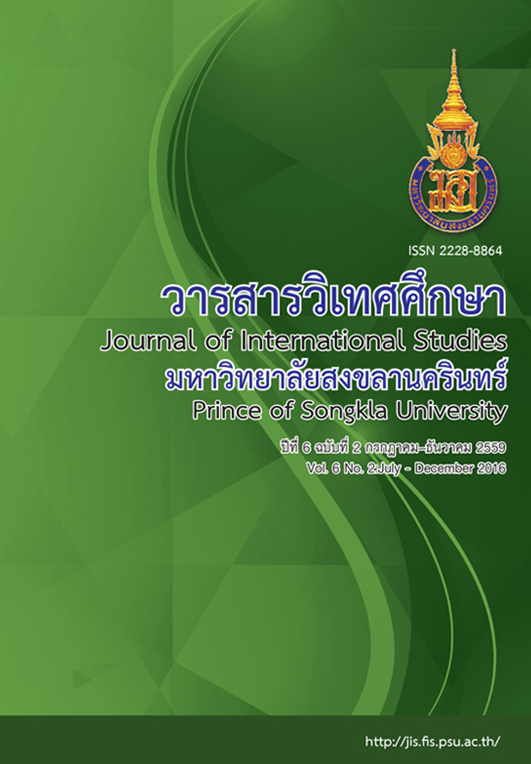The Development of Costumes in Baba Wedding Ceremony to Cabaret Shows
Main Article Content
Abstract
The Development of Baba Wedding Ceremony Costumes Used in Cabaret Shows for Phuket Tourism Promotion research employed qualitative methods. This research aimed to 1) study local Baba groups, wedding ceremonies and the costumes used in Baba wedding ceremony in Phuket 2) study cabaret performance to promote Phuket tourism and create guidelines for the development of Baba wedding ceremony costumes in cabaret shows 3) create cabaret shows from the wedding ceremony and the costumes used in Baba wedding ceremonies to promote tourism in Phuket. The areas of this research were Phuket Old Town, including several historical streets: Dibuk Road, Krabi Road, Thalang Road and Yaowarat Road. The researcher also selected 3 cabaret show companies: 1) Phuket Simon Cabaret 2) Phuket Simon Star Cabaret 3) Aphrodite Cabaret Show Phuket which were the main research areas for data collection. The methodology of this research included three stages. The key methods for data collection were the study of documents, observation, interviews, three focus groups and workshops with stakeholders; informants included casual informants and general informants, committees of Baba - Paranakan Association, Phuket Culture board committees, Phuket Old Town Community committees, Thai Women’s Empowerment Fund of Phuket Province committees, staff from Tourism and Sport Section at Phuket Provincial Administrative Organization, the executive director of Phuket Simon Star Cabaret and Performance Arts Program teachers. Data analysis was presented descriptively.
The research findings showed 1) the history; Baba people are descendents of Chinese immigrants who came from the East and the South of China and moved to the Malay Peninsula, where they settled there. Most of them were Hokkian Chinese. The major reasons for immigration were 1) political events 2) wars 3) hunger and poverty. They arrived at trading ports especially Phuket. When they had stable work these Chinese groups married with local people in Phuket. Some returned to China to bring their family to settle in Phuket. Therefore, a culture developed especially seen in the wedding ceremony. The wedding ceremony is divided into five stages: 1) Pitee Kan Lak Wan 2) Pitee Wai Fah Din 3) Pitee Lang Kao Ei 4) Pitee Pang Tae 5) Pitee Hok Wan and the costumes reflect the identity of Phuket 2) Phuket has splendid cabaret performances. Most cabaret acts imitate shows in overseas countries which can result in prosecution. The attires can also lead to sexual crime. A variation in Phuket is the Baba wedding ceremony which is held just once a year because it is very detailed. The casual informants are elderly and there is no systematic knowledge management and transfer of experience about the ceremony and costumes used in Baba wedding ceremonies, thus it might be lost in the future. However, the application of Baba wedding ceremony to cabaret show can promote local culture. 3) It was found that stakeholders who include the key informants, casual informants and general informants have cooperative ideas to develop costume for Baba wedding ceremony in cabaret shows in 3 ways 1) the development of the costumes in Baba wedding ceremony is based on cultural conservation. The development focuses on the traditional culture and the luxurious costumes of the groom, groomsmen and bridesmaids for cabaret shows but it is still conservative in style. 2) enhance relationship with China which is a great powerful country and is ranked as number one source of tourist in Phuket. These result macro and micro economics development 3) cabaret actors’ satisfaction revealed that agility of movement and emotional communication affected the aesthetics of performance. Recommendations for Phuket tourism promotion is that this research should be expanded to other types of performances such as opera, mime and ballet. Furthermore, there should be collaboration with local organizations for example the Thai Women’s Empowerment Fund in Phuket Province in order to continue development.
Article Details
Statements and opinions expressed in articles herein are those of the authors and do not necessarily reflect the position of the editors or publisher.
Article, information, text, image, etc. which are published in Journal of International Studies, belong to Journal of International Studies. If anybody or any organization would like to use part or whole of them, they must receive written permission from Journal of International Studies before usage.
References
ไซม่อน คาบาเรต์. สำนักงานไซม่อน คาบาเรต์ (แผ่นปลิว). สำนักงานไซม่อน ภูเก็ตคาบาเรต์, 2558.
เทิดชาย ช่วยบำรุง. 2552. บทบาทขององค์กรปกครองส่วนท้องถิ่นกับการพัฒนาการท่องเที่ยวอย่างยั่งยืนบนฐานแนวคิดเศรษฐกิจพอเพียง. การศึกษาปัญหาพิเศษ กรุงเทพฯ: วิทยาลัยพัฒนาการปกครองท้องถิ่น สถาบันพระปกเกล้า.
นพศักดิ์ นาคเสนา. 2546. นาฎยประดิษฐ์: ระบำพื้นเมืองภาคใต้. วิทยานิพนธ์ศิลปศาสตร์ มหาบัณฑิต จุฬาลงกรณ์มหาวิทยาลัย.
สาวิตร พงศ์วัชร์. 2555. ศาสตร์ ศิลป์ ถิ่นเลใต้. กรุงเทพมหานคร: ห้างหุ้นส่วนจำกัดสามลดา.
อรไท ครุฑเวโช. 2550. การมีส่วนร่วมของชุมชนเพื่อการพัฒนาการท่องเที่ยวอย่างยั่งยืนในจังหวัดภูเก็ต. การศึกษาปัญหาพิเศษ. มหาวิทยาลัยราชภัฏภูเก็ต.
อัญชลีพรรณ อมรวิวัฒน์. 2554. “มรดกวัฒนธรรม.” ประมวลบทความการบริหารงานวัฒนธรรม 2554, ฉบับที่ 3 เดือนมีนาคม : 12.
รายนามผู้ให้สัมภาษณ์
โกศล แตงอุทัย, น.พ., นายกสมาคมบาบ๋าเพอรานากัน อำเภอเมือง จ.ภูเก็ต. สัมภาษณ์, 28 มิถุนายน 2558.
ภัทรพงศ์ เวชบุตร, ประธานกลุ่มบริษัทท่องเที่ยวจังหวัดภูเก็ต อำเภอเมือง จ.ภูเก็ต. สัมภาษณ์, 18 ตุลาคม 2558.
สาวิตร พงศ์วัชร์. ครูภูมิปัญญาแห่งชาติ อำเภอเมือง จ.ภูเก็ต. สัมภาษณ์, 23 พฤศจิกายน 2558.


